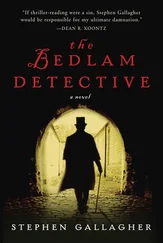Stephen Gallagher - The Boat House
Здесь есть возможность читать онлайн «Stephen Gallagher - The Boat House» весь текст электронной книги совершенно бесплатно (целиком полную версию без сокращений). В некоторых случаях можно слушать аудио, скачать через торрент в формате fb2 и присутствует краткое содержание. Жанр: Триллер, на английском языке. Описание произведения, (предисловие) а так же отзывы посетителей доступны на портале библиотеки ЛибКат.
- Название:The Boat House
- Автор:
- Жанр:
- Год:неизвестен
- ISBN:нет данных
- Рейтинг книги:3 / 5. Голосов: 1
-
Избранное:Добавить в избранное
- Отзывы:
-
Ваша оценка:
- 60
- 1
- 2
- 3
- 4
- 5
The Boat House: краткое содержание, описание и аннотация
Предлагаем к чтению аннотацию, описание, краткое содержание или предисловие (зависит от того, что написал сам автор книги «The Boat House»). Если вы не нашли необходимую информацию о книге — напишите в комментариях, мы постараемся отыскать её.
The Boat House — читать онлайн бесплатно полную книгу (весь текст) целиком
Ниже представлен текст книги, разбитый по страницам. Система сохранения места последней прочитанной страницы, позволяет с удобством читать онлайн бесплатно книгу «The Boat House», без необходимости каждый раз заново искать на чём Вы остановились. Поставьте закладку, и сможете в любой момент перейти на страницу, на которой закончили чтение.
Интервал:
Закладка:
She sat on the bed, next to her bags. Pete stood in the doorway and watched as she bounced a little and made the mattress creak. When she looked up at him and smiled, he could see that the dangerous edge of last night's exhaustion had been blunted.
He said, "I only wish I could help you more. But I wouldn't know how."
"You are helping me."
"That's not what I mean."
"I know what you mean," she said. "Please don't worry."
"There's tinned stuff in the kitchen if you wake up and I'm not around. If I'm not here, I'll probably be down at the boatyard. When I get the chance, I'll show you the sights."
"I'll manage," she assured him.
And so he made a gesture as if to say, It's all yours. And then he withdrew, closing the door after him, and went to his own room to stretch out for a while.
Alina stayed where she was, her eyes closed, almost as if she was listening to the silence. Pete must have dropped onto his bed without undressing, he made so little sound. Then she turned to the much-travelled carrier bag on the bed beside her.
From it she took a book, which she carried over to the dressing table. It was a cheap scrapbook, coarse paper between cardboard covers, so well used that some of the pages were starting to fall out. She laid it flat and opened it up.
The book was filled with photographs. A few of them would have been a serious giveaway in any frontier search, but these she'd covered over with postcard views bought from the Europiskaya Hotel.
She began to take out the postcards, revealing the snapshots underneath. When she reached a particular one, she stopped.
It was a group view, slightly blurred, a dozen friends on a day in the country. They were in rows like a football team, the people in the front row all kneeling on the ground.
Old times, sad times, a million miles away. For a while Alina sat looking at her younger, unmarked self. She was in the back row, lifted higher than anybody by the boys on either side of her.
That was how she'd been, back then. Open, smiling, everything before her.
Lifted on the arm of a boy named Pavel.
SEVEN
Pavel's was a city dawn, seen from the rear seat of the unmarked car as they circled back in on the motorway network toward their base near the airport. The night had not been a success. He knew that he'd been close, but then somehow it had all slipped away from him; when Alina hadn't come out and the three of them had finally gone into the building, it was to find incomprehension from the woman who lived alone and an empty flat where she said she'd gone for help. Pavel had no names, no numbers. He could go no further.
And his two escorts had shrugged and sympathised, and called it bad luck.
A couple of years ago, he'd never even have been able to get this far. The notion of such international cooperation would have been unthinkable even at senior Investigator level; but here the arrangements had been made and he'd been on a plane within a matter of hours. He had no official status and no powers of arrest, but once he'd identified Alina then the two officers along with him would have been able to detain her on immigration charges. Since she'd entered the country on stolen papers, she could then be deported back to Russia and the knotty question of extradition would never have arisen. An appeal for political asylum would have been likely to get her nowhere; Alina wasn't political, and never really had been. By most people's definition, she was a common criminal and nothing more.
For most people, but not in the eyes of Pavel. To Pavel, and probably to many of the others who'd fallen under her influence, she was the most uncommon criminal ever.
The Finns had found the boy within half an hour. He'd been hiding in a woodland graveyard, only half-heartedly concealed behind one of the leaning roofed crosses. He'd known almost nothing. Nothing of her true nature, not even — and here Pavel had been holding his breath at the back of the Border Control's interrogation room — where she'd been living for the past two years. The boy's eyes had met his own, and for a moment Pavel had been afraid; but the boy hadn't said anything, and after a moment he'd looked away.
An example of her power: scared as he was, the boy Nikolai had managed to hold out against telling them of her destination until it was too late for them to prevent her from reaching it. She'd used him and then abandoned him, and yet still he'd continued to protect her.
It was an impulse that Pavel could understand only too well. And compared to some in her past, the boy had been lucky.
The car rolled into the police yard, a hurricane-fenced compound within sight of the main runway and with a constant background of big jet engines racing up to power. There were a few marked vans here, but most of the cars were officers' private vehicles. As Pavel stepped out onto the asphalt, he could see the takeoff of a Cathay Pacific 747 through the chainlink and across a few hundred feet of grass; it seemed shockingly, dangerously close, and he turned his face away to look toward the main building. This was in four storeys and in a no-frills, prefabricated style that could have been anything — a tax office, a really dull hotel, a leaking hospital doomed never to come fully into service. Only the crest over the entrance door gave it away and that didn't entertain the eye much, either.
"I'll tell you what," one of the two men said. His name was Roger, and he'd made a few stabs at conversation in the course of the night. Pavel knew that he'd not been the best company but then, they hadn't been treating this job as anything particularly special. Some novelty value because he was the first Russian they'd ever had in the car, but that was all. Roger went on, "Why don't we put you in the canteen for a while, and I'll go and look for my boss. He's the one who's going to have to decide what to do with you now."
And Pavel said, "What's a canteen?"
They grinned as if he'd made a joke, and they walked him inside.
Pavel sat alone at a table in the corner of the police cafeteria. He bought nothing, because he'd no English money. Only half of the counter had opened up at this early hour and there were no more than half a dozen people in the place, most of them in uniform. He idly pushed around the salt and pepper to avoid meeting anyone's eyes, and then he took out a sachet from the sugar bowl and looked at it with curiosity. The label read Sweet'n'Low but the sachet appeared to be empty. He tore it open and found that it wasn't empty, just that the fine powder inside took up so little space. He tasted it, and then he put a few of the sachets in his pocket.
A policewoman came to get him. Her uniform shirt was crisp and her red hair had been tied back and she had a hint of an overbite. She said "Are you the Russian officer? I'm sorry, I don't know how to pronounce your name," and Pavel said, "Please don't worry about it," and got to his feet to follow her.
They smiled at each other politely in the lift, but nothing passed between them. Pavel was feeling as loose and unconnected as a bag of spanners, and with about as much energy. He looked at the floor. He'd closed his eyes once in the last forty hours, and that had only been a restless doze in the back of the car on the way to the border. He hadn't been able to sleep on the plane at all. He'd been wound-up and anxious ever since he'd come home from his shift and discovered her missing, an empty space under the bed where her bags had been and her photograph album — probably the most precious single item that she owned — gone. His first reaction had been one of panic. But Pavel was level-headed, and he knew that he had a certain inner strength; nobody could have kept her and cared for her in secret and for so long without it. After he'd found the half-burned counterfoil slips from the railway tickets stuffed down the back of the apartment's disused fireplace, his next move had been to return to his Militia post and report that an anonymous source had given him some information on the whereabouts of Alina Petrovna, escapee from the prison hospital and probable murderer of the psychiatrist Belov.
Читать дальшеИнтервал:
Закладка:
Похожие книги на «The Boat House»
Представляем Вашему вниманию похожие книги на «The Boat House» списком для выбора. Мы отобрали схожую по названию и смыслу литературу в надежде предоставить читателям больше вариантов отыскать новые, интересные, ещё непрочитанные произведения.
Обсуждение, отзывы о книге «The Boat House» и просто собственные мнения читателей. Оставьте ваши комментарии, напишите, что Вы думаете о произведении, его смысле или главных героях. Укажите что конкретно понравилось, а что нет, и почему Вы так считаете.











